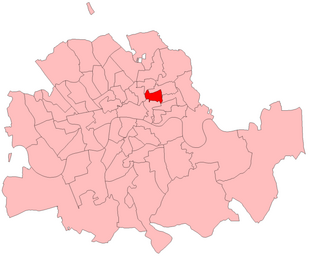Dumfries Burghs was a district of burghs constituency of the House of Commons of Great Britain from 1708 to 1801 and of the House of Commons of the Parliament of the United Kingdom from 1801 until 1918. It elected one Member of Parliament (MP).

John William Gulland was a British Liberal Party politician.
The Stalybridge by-election was a Parliamentary by-election held on 7 January 1905. The constituency returned one Member of Parliament (MP) to the House of Commons of the United Kingdom, elected by the first past the post voting system.

Sir Robert Jardine, 1st Baronet was a Scottish businessman and Liberal politician.

The Bethnal Green South West by-election was a Parliamentary by-election held on 29 July 1911. It returned one Member of Parliament (MP) to the House of Commons of the Parliament of the United Kingdom, elected by the first past the post voting system.
The Kilmarnock Burghs by-election was a Parliamentary by-election held on 26 September 1911. It returned one Member of Parliament (MP) to the House of Commons of the United Kingdom, elected by the first past the post voting system. The constituency consisted of five parliamentary burghs: Kilmarnock in the county of Ayr, Dumbarton in the county of Dumbarton, Rutherglen in the county of Lanark and Renfrew and Port Glasgow in the county of Renfrew.
The Edinburgh East by-election was a Parliamentary by-election held on 2 February 1912. The constituency returned one Member of Parliament (MP) to the House of Commons of the United Kingdom, elected by the first past the post voting system.
The Wick Burghs by-election was a Parliamentary by-election held on 8 December 1913. It was a Scottish Highland constituency that returned one Member of Parliament (MP) to the House of Commons of the United Kingdom, elected by the first past the post voting system. The constituency was a district of burghs representing the parliamentary burghs of Cromarty, Dingwall, Dornoch, Kirkwall, Tain and Wick. The by-election took place during the third anniversary of the Liberal Government's re-election of December 1910. It was thought to be a key indicator to the outcome of the following general election anticipated to take place in 1914-15.
The Mid Derbyshire by-election was a Parliamentary by-election held on 15 July 1909. The constituency returned one Member of Parliament (MP) to the House of Commons of the United Kingdom, elected by the first past the post voting system.
The High Peak by-election was a Parliamentary by-election held on 22 July 1909. The constituency returned one Member of Parliament (MP) to the House of Commons of the United Kingdom, elected by the first past the post voting system.
The Ayr Burghs by-election was a Parliamentary by-election held on 30 January 1904. The constituency returned one Member of Parliament (MP) to the House of Commons of the United Kingdom, elected by the first past the post voting system.
The St Andrews Burghs by-election was a Parliamentary by-election held on 17 September 1903. The constituency returned one Member of Parliament (MP) to the House of Commons of the United Kingdom, elected by the first past the post voting system.
The Argyllshire by-election was a Parliamentary by-election held on 26 August 1903. The constituency returned one Member of Parliament (MP) to the House of Commons of the United Kingdom, elected by the first past the post voting system.
The Stirling Burghs by-election was a Parliamentary by-election held on 22 May 1908. The constituency returned one Member of Parliament (MP) to the House of Commons of the United Kingdom, elected by the first past the post voting system. The by-election was caused by the death of the former Liberal Prime Minister, Sir Henry Campbell-Bannerman
The Ilkeston by-election was a Parliamentary by-election held on 1 July 1912. The constituency returned one Member of Parliament (MP) to the House of Commons of the United Kingdom, elected by the first past the post voting system.

The Orkney and Shetland by-election was a Parliamentary by-election held on 18–19 November 1902. The constituency returned one Member of Parliament (MP) to the House of Commons of the United Kingdom, elected by the first past the post voting system.
The Banffshire by-election was a Parliamentary by-election held on 16 February 1907. The constituency returned one Member of Parliament (MP) to the House of Commons of the United Kingdom, elected by the first past the post voting system.
The Basingstoke by-election was a Parliamentary by-election held on 12 March 1906. The constituency returned one Member of Parliament (MP) to the House of Commons of the United Kingdom, elected by the first past the post voting system.
The Elgin Burghs by-election was a Parliamentary by-election held on 8 September 1905. The constituency returned one Member of Parliament (MP) to the House of Commons of the United Kingdom, elected by the first past the post voting system.

The Sowerby by-election was a Parliamentary by-election held on 2 July 1904. The constituency returned one Member of Parliament (MP) to the House of Commons of the United Kingdom, elected by the first past the post voting system.





